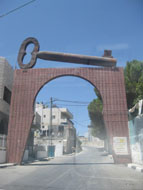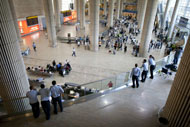
The uproar over President Mahmoud Abbas’ statements made during an interview with Israel’s Channel Two last week has been unprecedented in a number of ways. While it is true that this ‘storm’ has remained mostly within the confines of social networks and statements made to the media by agenda-driven politicians, it cannot and should not be ignored. This is mainly because people’s opinions are the litmus test for leaderships to see what they are doing right and in this case, where they went wrong.
In the case of President Mahmoud Abbas, a slew of wrong circumstances came together all at once. Whether or not his statements were misconstrued, misinterpreted, edited by the television station or simply a case of bad translation, the end result is that the majority of the Palestinians are saying he forfeited one of the most sacred “red lines” of our cause: the refugee right of return.
When asked about his birthplace, the town of Safad which is now in northern Israel, President Abbas said this: “I visited Safad before, once. But I want to see Safad. It's my right to see it, but not live there." Abbas later told an Egyptian television station that his statements on Safad were “personal” and did not mean he had conceded the right of return.
Whether this is true or not is irrelevant, because President Abbas’s personal opinions are irrelevant to his people. He is their president, not their average Joe on the street. He is the President of Palestine, the head of the PLO, of Fatah and of the Palestinian Authority and he does not speak for himself. That is why, regardless of whether he “meant it or not” he represents a people for whom the right of return is the holy grail of the Palestinian cause.
And so, Abbas made a mistake. Unfortunately, the timing of the interview was not to his favor either. The 95th anniversary of the Balfour Declaration on November 2 was commemorated right around the same time the infamous interview came out, casting the President in an even more unfavorable light with Palestinians who feel the injustice done in 1917 has yet to be recognized much less rectified by the world.
In all fairness, other things were said in the interview. President Abbas told the Israeli interviewer that settlements were the unilateral steps which needed criticism not the Palestinians’ UN bid. He said he adhered to the 1967 borders as boundaries of a future Palestinian state, something which the Palestinians have come to accept even though the option is no longer viable on the ground. But the interview also showed Abbas saying he would not allow a third intifada under his watch, saying the leadership opted for “diplomacy, nonviolence and negotiations.”
The interview, which of course was devoured by Abbas’ ill-wishers, namely Hamas in Gaza, will probably not spell the end of his political career. However, if it is possible to turn something negative into something positive, a valuable lesson can be learned: A democratic leader who claims to be in touch with his people must take those words to heart. The Palestinians are in need of a strong leadership which understands the cornerstones of their national existence. The right of return is one of these cornerstones that cannot and should not be compromised. If President Abbas wants to prove he is the leader of the people and put Hamas’ wagging tongues to rest once and for all, he must take his cues from the people.
It is not about personal opinions, about seats of power that mean absolutely nothing if the people are not there to back him, or even about scoring points with an international community that has turned its back on the Palestinians time and again. The leadership is far from its mark when it comes to listening to its people. Perhaps now, when the heat is on, it can find its way back to where it belongs.
Joharah Baker is a Writer for the Media and Information Department at the Palestinian Initiative for the Promotion of Global Dialogue and Democracy (MIFTAH). She can be contacted at [email protected].









